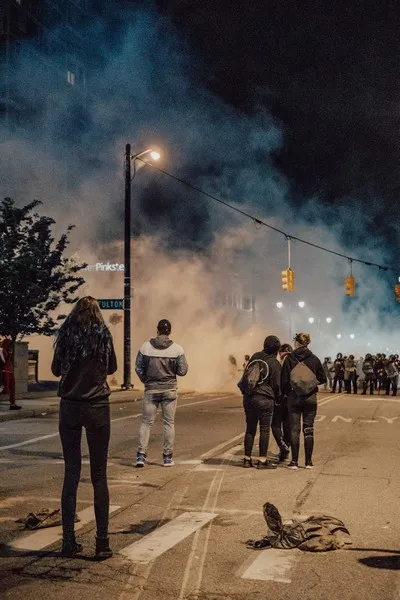Riots have been a recurring phenomenon throughout history, often capturing the attention of societies and leaving a lasting impact on communities. In sociology, understanding the nature of riots involves exploring the underlying causes, dynamics, and consequences of these collective outbursts. This article aims to outline and explain the nature of riots from a sociological perspective.
1. Definition and Characteristics
A riot can be defined as a spontaneous and violent public disturbance involving a large group of people. It typically arises from a sense of frustration, anger, or discontent towards a perceived injustice or grievance. Riots often involve acts of vandalism, looting, arson, and clashes with authorities.
2. Causes of Riots
Riots are complex events with multiple causes. Sociologists have identified several factors that contribute to the occurrence of riots:
Social Inequality
One of the underlying causes of riots is social inequality. When marginalized groups or communities face systemic discrimination, economic disparities, or political exclusion, it can lead to feelings of frustration and anger, which can manifest in riotous behavior.
Political Oppression
Riots can also be a response to political oppression. When people feel oppressed, suppressed, or denied basic rights and freedoms, they may resort to rioting as a means of expressing their discontent and demanding change.
Perceived Injustice
Perceived injustice, whether real or imagined, can ignite riots. Instances of police brutality, corruption, or unfair treatment can trigger widespread anger and unrest within a community, leading to violent protests.
3. Dynamics of Riots
Riots are not random acts of violence; they follow certain dynamics that sociologists have identified:
Collective Behavior
Riots are a form of collective behavior where individuals come together to express shared grievances. The actions of individuals in a riot are often influenced by the behavior and emotions of the group, leading to a contagion effect.
Emotional Contagion
Emotions spread rapidly within a rioting crowd. The collective anger, frustration, and excitement can fuel the intensity and escalation of the riot, leading to more destructive behavior.
Deindividuation
Rioters often experience a sense of anonymity and reduced self-awareness, which can lead to a loss of inhibitions and an increase in aggressive behavior. This phenomenon, known as deindividuation, contributes to the destructive nature of riots.
4. Consequences of Riots
Riots have wide-ranging consequences, affecting individuals, communities, and societies:
Physical and Economic Damage
Riots often result in significant physical damage to property, infrastructure, and businesses. The economic consequences can be severe, leading to job losses, decreased investment, and a decline in the affected area’s overall development.
Loss of Lives and Injuries
Riots can result in the loss of lives and injuries, both among rioters and law enforcement personnel. The violence and chaos that ensue during riots pose significant risks to public safety.
Political and Social Change
In some cases, riots can lead to political and social change. They can draw attention to systemic issues, spark public debates, and put pressure on authorities to address grievances and implement reforms.
5. Societal Responses
Societies respond to riots in various ways:
Law Enforcement and Security Measures
Authorities often deploy law enforcement personnel and security measures to restore order and prevent further violence during riots. This can include the use of tear gas, rubber bullets, or even the deployment of the military in extreme cases.
Community Engagement and Dialogue
Some societies emphasize community engagement and dialogue as a means of addressing the underlying issues that lead to riots. This approach focuses on fostering understanding, empathy, and finding peaceful resolutions.
Policy Reforms
Riots can prompt policymakers to implement reforms that address the grievances expressed during the riots. These reforms may aim to reduce social inequalities, improve police-community relations, or enhance political participation.
In conclusion, riots are complex social phenomena that require a comprehensive sociological understanding. By examining the causes, dynamics, and consequences of riots, sociologists can contribute to the development of strategies that promote social justice, equality, and peaceful resolution of conflicts.





